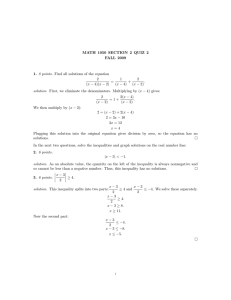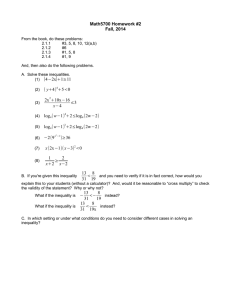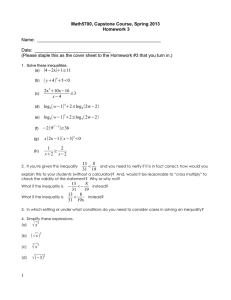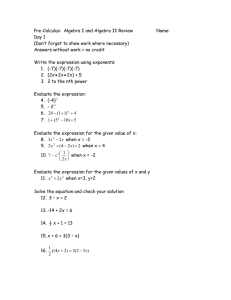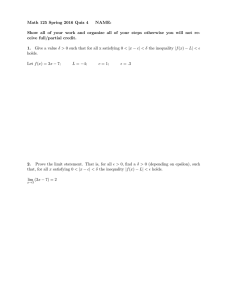Inequality and the Process of Development Oded Galor July 9, 2015
advertisement
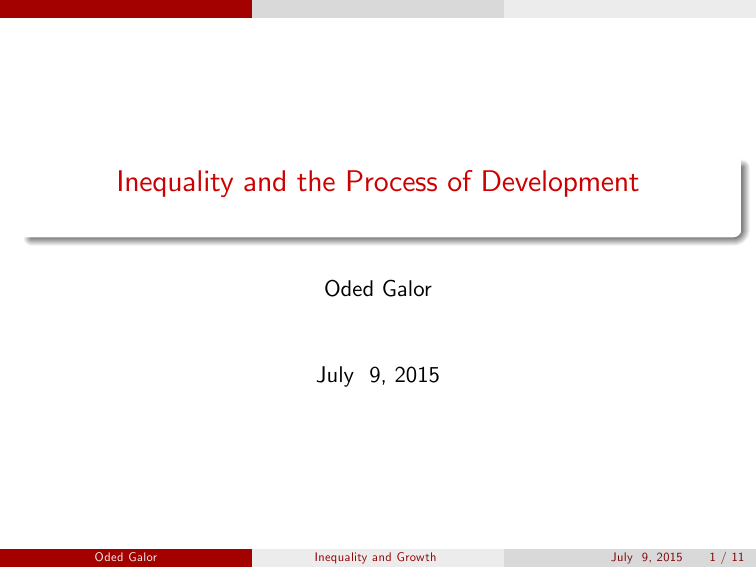
Inequality and the Process of Development Oded Galor July 9, 2015 Oded Galor Inequality and Growth July 9, 2015 1 / 11 From the Classical to the Modern Perspective The Classical Paradigm The Classical Theory Inequality is bene…cial for growth (in the post-industrialization stage) Keynes (1920), Kaldor (1957) The marginal propensity to save increases with income Inequality channels resources towards individuals whose marginal propensity to save is higher =) increases aggregate savings & capital accumulation =) enhances the development process Oded Galor Inequality and Growth July 9, 2015 2 / 11 From the Classical to the Modern Perspective The Neoclassical Viewpoint The Neoclassical Paradigm The Representative Agent Approach Rejects the role of heterogeneity, and thus income distribution, in economic growth Growth Process ) Income Distribution Income Distribution ; Growth Process Oded Galor Inequality and Growth July 9, 2015 3 / 11 The Modern Perspective The Modern Perspective: Origins Galor and Zeira (1988, 1993) Unlike the Neoclassical Paradigm Income Distribution ) the growth process Unlike the Classical Perspective Underlined the adverse e¤ect of Inequality on the growth process Oded Galor Inequality and Growth July 9, 2015 4 / 11 The Modern Perspective The Credit market imperfection Channel The Credit Market Imperfections Approach: Assumptions Main assumptions: Credit market imperfections Di¤erences in the interest rates for borrowers and lenders and either Fixed investment cost in education or in other individual-speci…c projects or Saving and bequest rates are increasing function of wealth (Moav, (2002) Galor and Moav (2004)) Oded Galor Inequality and Growth July 9, 2015 5 / 11 The Modern Perspective The Credit market imperfection Channel The Credit Market Imperfections Approach: Mechanism Inequality a¤ects occupational choices: entrepreneurs vs. workers skilled vs. unskilled workers or Non-poor economies: Inequality =) under-investment in human capital (inv’t projects) that is transmitted across generations =) lower output growth in the short-run and in the long-run Poor economies: Inequality permits some investment in HC (inv’t projects) and may thus promote output growth The human capital channel is consistent with evidence Oded Galor Inequality and Growth (Perotti (1996)) July 9, 2015 6 / 11 The Modern Perspective The Political Economy Channel The Political Economy Approach Echoes the hypothesis of the CMI Approach Inequality is harmful for the growth process Inequality =) political pressure for redistribution Higher (distortionary) taxation =) lower investment and slower economic growth Alesina and Rodrik, (1994) Persson and Tebelini (1994) This channel is inconsistent with evidence Oded Galor Inequality and Growth (Perotti (1996)) July 9, 2015 7 / 11 The Modern Perspective The Political Economy Channel The Political Economy Approach: An Alternative Channel Inequality is harmful for the growth process Inequality =) incentive for better endowed agents (landowners) to block redistribution E¢ cient redistribution policies are not implemented Benabou, (2000), Galor-Moav-Vollrath (2009) Oded Galor Inequality and Growth July 9, 2015 8 / 11 The Modern Perspective Socio-Political Instability The Socio-Political Instability Approach Echoes the hypothesis of the CMI Approach Inequality is harmful for the growth process Inequality =) Socio-Political instability Socio-Political instability =) reduces the security of property rights =) lower investment and slower economic growth (Alesina and Perotti (1996)) This channel is consistent with evidence Oded Galor (Perotti (1996)) Inequality and Growth July 9, 2015 9 / 11 The Modern Perspective Gender Inequality Gender Inequality Gender inequality is harmful for the growth process Galor-Weil (AER 1996) Gender inequality reduces the opportunity cost of raising children more than it reduces household income =) increases fertility =) reduces human capital investment (quantity-quality trade-o¤) =) lowers female labor force participation =) slows the growth process Oded Galor Inequality and Growth July 9, 2015 10 / 11 The Modern Perspective The Uni…ed Approach A uni…ed theory of inequality and economic development Galor and Moav (2004): Captures the changing role of inequality in the growth process Uni…es the Classical and the Modern Paradigms Provides an intertemporal reconciliation between con‡icting viewpoints about the e¤ect of inequality on economic growth Underlines the role of inequality in triggering socio-political transition (Galor- Moav-Vollrath (2009), Galor-Moav (2006)) Oded Galor Inequality and Growth July 9, 2015 11 / 11
